For almost 12 years, I’ve been wondering if I’d ever play another game that made me feel as guilty as I did when I was a Sith in Knights of the Old Republic II. With Tyranny, Obsidian have managed to win a game of one upmanship with themselves, leaving me cuddling my dog and wondering if I am, in fact, a terrible person.
Read our review of Bastard’s Wound to see if you should pick up Tyranny’s expansion.
Allow me to put off incriminating myself for a moment, because there’s a lot more to Tyranny than being a horrible bastard. It is, unsurprisingly given Obsidian’s history, an RPG that’s filled to the brim with choices that lead to meaningful and lasting consequences. It goes so much further than any other game in the developers’ library, however.
The important decisions start the moment you create your character, though they never trap you or force you to play in a specific way. Tyranny has a classless system where you pick two starting battle styles from a list of magic and weapons, so you’re never tied down. Even if you pick two-handed swords and bows to start with, you can learn to be proficient in whatever you want once the game properly begins. Similarly, while you can buff any of the game’s many skills, like lore or athletics, you can focus on entirely different ones when you actually start adventuring, leveling them up simply by using them, mostly through dialogue options or interacting with the environment. The really meaty choices at character creation level, however, relate more to your background.
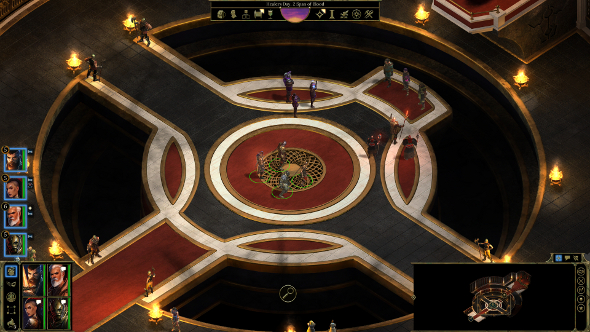
Were you a pit-fighter before Kyros, Overlord and conqueror of almost the entire world, forced you to become an employee? Maybe you were a diplomat, instead. Or perhaps you spent your formative years in a guild learning letters and magic. These backgrounds help give you a basis for your character, but also crop up often in dialogue.
That’s ancient history, though, and perhaps more important is what you did during the first three years of the invasion of the Tiers. This region is the last place in the known world not completely under Kyros’ control, and before you start exploring, there’s a prologue that takes the form of a Choose Your Own Adventure. As a Fatebinder, you’re a diplomat, mediator, and a fixer for Tunon, Kyros’ second-in-command, giving you a great deal of authority, even over your supposed superiors, the Archons, men and women with incredible gifts and curses.
Conquest, the name given to the prologue, has a gargantuan impact on the rest of the game. It tasks you with choosing how you helped conquer the region, what conflicts you were involved in, which of the two main military factions – the Disfavored and Scarlet Chorus – you tended to side with, and if you were violent, cruel, sneaky, honourable… there’s a lot packed into what is quite a short introduction. Depending on how you proceed, the world might be quite different. People live or die and cities stand or fall at your whim, and it’s through this prologue that you start working on your reputation.
My Fatebinder, for example, was known throughout the game’s first area as Queenslayer, for my rather dastardly deeds at a diplomatic meeting with some enemy royals during the prologue. It’s more than a title; it’s a badge of honour and a pejorative spat through gritted teeth, depending on which NPC you ask.
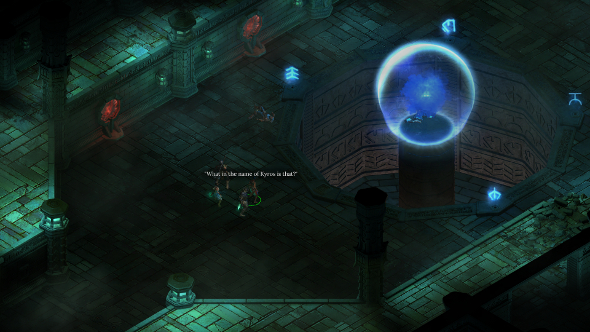
A lot of time is spent fleshing out the world with massive chunks of lore, sometimes through conversation but also via links embedded in the text that open up new boxes with even more history. It’s a lot to take in but is mostly introduced organically, though it does threaten to bog the game down in the first five hours, where you’ll be doing more reading than adventuring. Thankfully, the writing is all high-quality stuff, particularly when it comes to companions, who chime in frequently and develop friendships and enmity with each other, as well as you. Obsidian have made sure to fill the game with well-rounded, compelling allies, which I suspect they know makes it all the more disturbing when you break them.
Not unlike RPG titans such as Planescape: Torment, Tyranny manages to work magic within its boxes of text, fat as they are with countless paths and potential outcomes, dependent on a vast array of calls you’ll make throughout the game. Every deed echoes across the three acts, informing the world what type of person you are. The Tiers, the region in which Tyranny is set, remembers. Your companions will certainly remember, especially if you kill their friends and force them to serve you. It’s the unusual central hook of the game, that you’re essentially playing a fantasy version of Judge Dredd, that makes interacting with the various factions and people of the Tiers so compelling, however.
Your position of authority is not just fluff and flavour – from the outset, the Fatebinder has a great deal of clout, and there are always plenty of ways to flex your authoritarian muscles. The main goal, initially, is to act as mediator between the two branches of Kyros’ military: the orderly and elite Disfavored and the chaotic and savage Scarlet Chorus. Either faction can eventually be sided with, if that sounds like your cup of tea and you don’t decide to help out the rebels. But plenty more people will want you to use your knowledge of the law to arbitrate disputes. How you go about that, of course, is entirely up to you.
Power and influence drive the game and take on an almost mystical quality. Regardless of whether you chose to break or save the Tiers, these are merely the end results, and it’s the acquisition of power that lets you do that, giving you abilities that go well beyond those of a mortal human. Following Kyros’ philosophy is uncomfortably seductive and subverts a genre that tends to put you in the shoes of a wandering adventurer whom nobody knows. Instead, almost everyone knows who you are, and rightly fears you. You speak with Kyros’ voice, and thus the voice of a god. This is emphasised through Edicts, incredibly powerful spells that Kyros creates and then makes their Fatebinders utter, bathing realms in fire and cursing them with storms. It’s a power you’ll eventually harness. You don’t have to be a terrible person, though.
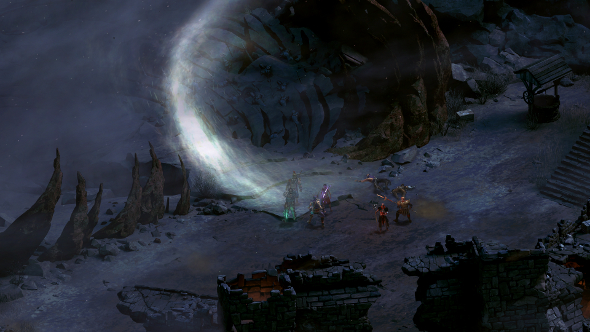
Morality is a complex and nuanced thing in Tyranny, with good people being forced to do terrible things to survive. The disturbing state of the world has left people broken and desperate. And there’s even a twisted logic to Kyros’ conquest, which purports to bring stability and civilization to the bronze-age society. Kyros is all about law and order, but Fatebinders are allowed to interpret the law themselves. So while you’re essentially a servant to a great power, you have a lot of freedom, which sometimes means you can have a positive impact on the Tiers. Break Kyros’ laws, however, without good reason, and there are deadly consequences.
A deep reputation system is how Tyranny expresses the consequences of your actions. With factions and NPCs, you’ll gain favour or wrath, and with companions it’s loyalty or fear. Actually, I should say ‘and’, not ‘or’, because they aren’t mutually exclusive. You can have companions that are both fearful and loyal, while factions can both admire and be frustrated by you, at the same time. And everyone reacts differently, using their own individual moral compasses.
Take the treatment of prisoners, for example. The Disfavored, being efficient and no-nonsense, don’t tend to take prisoners, but they do treat their enemies with a modicum of respect. The Scarlet Chorus, on the other hand, enslave and conscript prisoners to bolster their huge fighting force, but revel in torture and mind games. Gaining favour with these groups, then, requires different tactics. The Chorus approved, for example, of my decision to allow a captured officer to join their ranks only if she used a rock to bludgeon her fellow prisoners to death. They’re a disturbing bunch and only respect strength.
What really makes Tyranny’s quests and dialogue stand out is the way it lavishes its text with extra context. I’m sure we’ve all been a bit frustrated in games like Skyrim or Dragon Age, where we’re trying to play a villain, but we’re forced to suspend our disbelief when accepting quests where the only option is to act like a hero. Tyranny allows you to do ostensibly good deeds while still reinforcing the fact that you’re doing them for horrible reasons. Or, alternatively, you can do arguably awful things for the greater good. This is a game that gives you five different ways to kill a fatally injured enemy you encounter, depending on how you want to justify it.
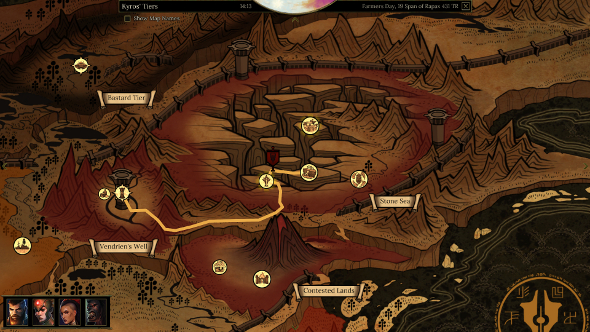
Reputation’s importance goes well beyond its impact on the story and how people view you, though. It has significant gameplay benefits, too. As your reputation spreads, and as your companions develop opinions about you, you get new passive abilities and active powers. They’re all positive things, as well, so pissing people and groups off can sometimes be in your best interest. You’ll unlock combos this way, too, which are the game’s flashiest powers. Get friendly with Verse, the bloodthirsty and pragmatic member of the Chorus who joins your ranks very early on, and you’ll be able to punch the ground so hard that she’ll go flying up into the air, where she can let loose arrows on foes from a better vantage point.
The breadth of abilities is impressive, particularly given the game’s brevity – expect to finish within 25 hours – and it can be a little daunting. New abilities can be unlocked every time you level up, through making friends and enemies, and by equipping special artefact weapons and armour that grow in power. The Fatebinder has lots of trees to pluck abilities from, while companions only have two, but even then they can be specialised in several different ways. Then there’s magic, and boy is there a lot going on there.
Spells are highly customisable, made up of sigils that can be learned from scrolls or other more esoteric methods, creating a gargantuan list of potential arcane tricks. You start with the spell’s core, like fire, then decide its range, and then its upgrades. So there isn’t simply a fireball spell. There’s a fireball, an AoE, and touch spell, and you can then empower it with a longer burning duration, or maybe transform it into magefire, which adds a frost effect too. Any character can equip any spell, as long as they have a high enough lore skill.
It’s such a shame, then, that fights are largely boring, especially when compared to Pillars of Eternity. The system itself is fantastic, perhaps the best descendent of Infinity Engine-style combat, but the actual encounters are bizarrely conservative, with most enemies being simple soldiers and the occasional magic user, who generally just stay in one place and wait for you to engage them before moving. Patrols are rare. When Tyranny does introduce an enemy that’s not just a plain dude with some weapons and the same abilities you’ve seen a hundred times already, they’re quickly forgotten, and it’s back to fighting more soldiers.
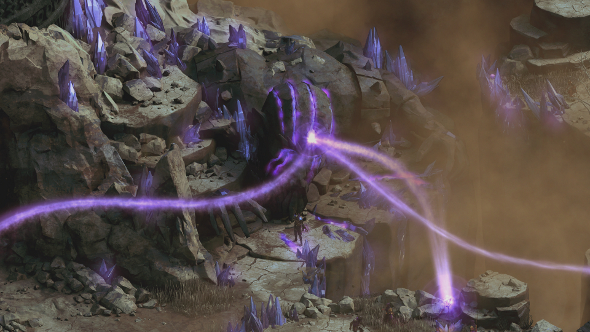
On the normal difficulty, you can pretty much sleepwalk through most uninspired brawls. Harder difficulties do pose more of a challenge, but certainly don’t make the scraps any more interesting. And then act three kicks off and Tyranny suddenly changes tack. The very brief final act is essentially a series of boss battles in a game that, up until that point, didn’t really have boss battles. Sure, you’ll meet slightly tougher enemies who are important to the story in the earlier acts, but those fights are the same as the rest. I found myself entirely unprepared for the difficulty spike, and I really struggled to manage the waves of enemies and the new abilities they had. It’s just so strange that they’re all crammed into the last couple of hours.
And then Tyranny just sort of ends. Abruptly. A few very tricky fights, a huge looming threat that’s overcome in the most unsatisfying way possible, and then ‘boom’, epilogue.
I have to wonder if Tyranny was meant to be much larger. There’s certainly plenty of evidence to suggest that this is the case: the dearth of enemy diversity, the uneven pacing, the jarring final act, and then there’s a crafting and research system that barely has any time to develop – it feels like a lot of cuts were made. It’s especially disappointing in a game that is often genuinely exceptional.
Despite this disappointment, I can’t help but be impressed with what Tyranny does get right. Though I’ve mentioned Knights of the Old Republic II and Planescape: Torment, there isn’t really another RPG like Obsidian’s latest. It’s incredibly bold, and if you go down the darker path, often sickening. When it’s at its best – pretty much the entirety of the fantastic and thankfully quite meaty second act – it more than holds its own against the greatest PC RPGs.
